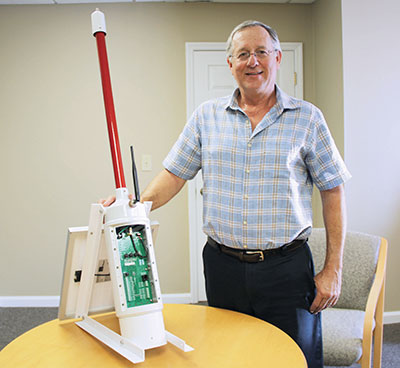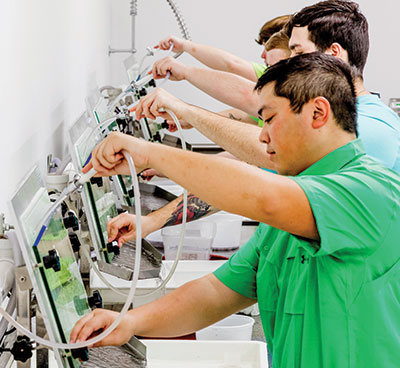By Lorie Hailey

In 2011, Bob Farinelli was enjoying the pool at his home in Nicholasville, having recently retired from running a home automation company, when Ryan Heringer, one of his former customers from Jonesboro, Ark., called him with a story and an idea.
A farmer having a system installed to control his pool with a smart phone app had told Heringer he wished he could just as easily control the on and off functions of the wells that irrigate the crops on his large farm. Farinelli, intrigued, said he would look into whether this was something that could be created with available technologies. He discovered this was a big problem for farmers and that there weren’t any great solutions on the market.
In 2012, with input from farmers, Farinelli, Heringer and two other partners founded Smart Farm Systems, a unique, large-area, wireless monitoring and control system for remotely located irrigation pumps with environmental, soil moisture and water level monitoring devices. The system helps farmers better understand and control their irrigation water management practices, and apply just the right amount of water at the right time, on a field-by-field basis. It has been a gamechanger for medium- to large-scale farming operations, where farm employees typically would have to drive from pump to pump to manually control irrigation wells.
It took nearly six years to research, develop and commercialize the product. In 2018, Farinelli’s team started selling the system, and 32 farmers are currently using it – mostly commodity crop growers and large-scale operations in the Mid-South.
- IT’S FREE | Sign up for The Lane Report email business newsletter. Receive breaking Kentucky business news and updates daily. Click here to sign up
Raising capital has been the most difficult part of the process, he said. The company received investment funds from Bluegrass Angels and the Kentucky Enterprise Fund, among others. In September 2019, the Commonwealth Commercialization Center (C3) invested $150,000 in Smart Farm from its newly established C3 Enterprise Fund 2. The first company to be funded, Smart Farm was chosen because it is an agtech company with great potential and experienced leadership, said Brian Mefford, executive director of KY Innovation.
“You can’t raise all of the money you need right away,” Farinelli said. “This is kind of an important message for other entrepreneurs. You have to be able to use what little you do raise very efficiently to get into the next set of proof points or the next set of value creation events to then show people that your idea has merit.”
“It’s just a lot of hard work,” he added. “You have to be tenacious and you have to not be too bummed out when things don’t go your way. Just ‘keep your nose to the grindstone’ is really the best way to describe the process, at least for me.”
Farinelli often serves as a mentor to newer startup owners. His advice to budding entrepreneurs: If possible, attend an accelerator program. Learn how to appropriately create a pitch deck (sales presentation). Acquire a rich uncle (ha!) and find a mentor. Apply for grants. Get plugged in to the local entrepreneurial community.

Male mosquitoes don’t bite: The fact that launched MosquitoMate
Most people do whatever they can to get rid of mosquitoes. We have our yards sprayed, we make sure there’s no standing water for eggs to hatch into larvae, and we spend countless dollars on citronella candles, bug zappers and sprays.
But Stephen Dobson, an entomology professor at the University of Kentucky, has found a very creative way to get rid of mosquitoes. He makes more of them.
What?
So, here are some fun facts: Unlike female mosquitoes, male mosquitoes do not bite. Since female mosquitoes tend to be monogamous, once a sterile male mates with a female, her eggs will not hatch, thus eliminating the next generation of mosquitoes.
Armed with this idea, Dobson and his wife, Karen, created MosquitoMate, a company that produces sterile male mosquitoes as a biopesticide, founded on intellectual property developed at UK. Mosquito Mate employs more than 20 people at its 6,000-s.f. research and development facility off Regency Road in Lexington, where they produce more than 50 million eggs and 3 million sterile males per week.
 The company received EPA approval in 2017, and now sells sterile male mosquitoes as a pest control service. The product only works on Asian Tiger mosquitoes, which are invasive in the United States and commonly known to carry infectious diseases such as the Zika virus. The Asian Tiger species is the main biting nuisance in many urban areas like Lexington.
The company received EPA approval in 2017, and now sells sterile male mosquitoes as a pest control service. The product only works on Asian Tiger mosquitoes, which are invasive in the United States and commonly known to carry infectious diseases such as the Zika virus. The Asian Tiger species is the main biting nuisance in many urban areas like Lexington.
As more non-biting males are released, the biting mosquito population can decrease dramatically, the company found in its research trials.
“MosquitoMate is an excellent example of success being cultivated here in Central Kentucky,” said Terry Samuel, executive vice president and chief operating officer of the Kentucky Science and Technology Corp. “Start with leading scientists leveraging technology and expertise from UK, add in support from Commerce Lexington Inc., the Kentucky Science and Technology Corp. and the Cabinet for Economic Development and the result is a home-grown company that is not only growing commercially, but also preventing the dissemination of some of the world’s most serious diseases.”




















Add Comment